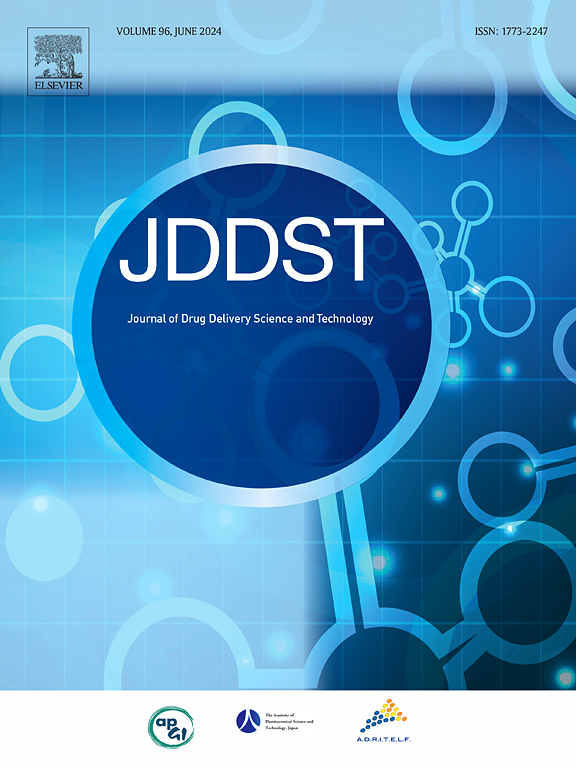Nano-apatite with Doxycycline for pulp capping: A potential strategy to reduce inflammation and promote pulp healing
IF 4.5
3区 医学
Q1 PHARMACOLOGY & PHARMACY
Journal of Drug Delivery Science and Technology
Pub Date : 2025-05-31
DOI:10.1016/j.jddst.2025.107069
引用次数: 0
Abstract
The aim of the study is to develop a specialist dental capping agent that is particularly formulated to target pulp inflammation. The study included the synthesis of nano-apatite using Lepidium sativum (nHALS) that was loaded with Doxycycline (nHALS@DXC) utilizing an in vitro model of pulpitis with an O-antigen (O-A). The nanoscale HALS were analysed using scanning electron microscopy (SEM) and Transmission electron microscopy (TEM) to assess their odontogenic properties. The diameter of the nHALS nanoparticles ranged from 20 to 33 nm in width and 80–170 nm in length. Doxycycline has been identified as an appropriate loading material for medicinal applications. While the effect of nHALS@DXC on the odontogenic competence of HDPSCs was not superior to that of nHALS alone, it exhibited a more significant anti-inflammatory effect. The findings indicate that nHALS@DXC has the capacity to serve as an effective agent for pulp capping, perhaps surpassing nHALS in terms of reducing inflammation and activating dental pup cells to enhance pulp repair after injury.
纳米磷灰石加强力霉素用于牙髓封盖:一种减少炎症和促进牙髓愈合的潜在策略
本研究的目的是开发一种专门针对牙髓炎症的牙盖剂。该研究包括利用带有o抗原(O-A)的牙髓炎体外模型,利用负载多西环素(nHALS@DXC)的Lepidium sativum (nHALS)合成纳米磷灰石。采用扫描电子显微镜(SEM)和透射电子显微镜(TEM)对纳米级HALS进行分析,评估其牙源性。nHALS纳米颗粒的直径为20 ~ 33 nm,长度为80 ~ 170 nm。强力霉素已被确定为一种合适的药用负载材料。虽然nHALS@DXC对HDPSCs成牙能力的影响并不优于单独使用nHALS,但其抗炎作用更为显著。研究结果表明nHALS@DXC有能力作为一种有效的牙髓封盖剂,在减少炎症和激活牙幼体细胞以增强损伤后牙髓修复方面可能超过nHALS。
本文章由计算机程序翻译,如有差异,请以英文原文为准。
求助全文
约1分钟内获得全文
求助全文
来源期刊
CiteScore
8.00
自引率
8.00%
发文量
879
审稿时长
94 days
期刊介绍:
The Journal of Drug Delivery Science and Technology is an international journal devoted to drug delivery and pharmaceutical technology. The journal covers all innovative aspects of all pharmaceutical dosage forms and the most advanced research on controlled release, bioavailability and drug absorption, nanomedicines, gene delivery, tissue engineering, etc. Hot topics, related to manufacturing processes and quality control, are also welcomed.

 求助内容:
求助内容: 应助结果提醒方式:
应助结果提醒方式:


